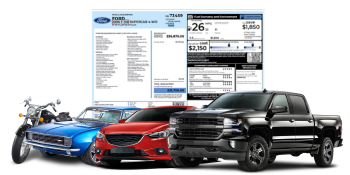Buying a used car can feel risky. You want a reliable vehicle, but what if something goes wrong? That’s where warranties come in, offering peace of mind and protecting you from unexpected repair bills.
A used car warranty from a dealership can help you avoid costly repairs and give you confidence in your purchase. But not all warranties are the same. Knowing what to look for and understanding the advantages of dealership warranties can make all the difference.
To find details about the manufacturer’s warranties for your car or the one you’re considering, our window sticker lookup service is here to provide you the details, so you can buy any car with clarity.
RELATED: What to Bring When Buying a Car from a Dealership
What is a Used Car Warranty from a Dealership?
A used car warranty from a dealership is a promise that the dealer will cover certain repairs or services if problems arise within a set time frame after purchase. Unlike the original manufacturer’s warranty, which typically covers a new vehicle for several years, dealership warranties for used cars are usually shorter and cover specific parts of the vehicle.
Dealership warranties stand out from third-party warranties. While third-party warranties can be purchased from independent companies, dealership warranties are offered directly by the seller, making the claims process simpler. With dealership warranties, you often have the added advantage of taking the car back to the dealership for repairs.
Types of Used Car Warranties Offered by Dealerships
Dealerships may offer several types of warranties for used cars, each providing different levels of protection.
Limited Warranty
Limited warranties are the most common type offered by dealerships. They cover basic components, such as the engine and transmission, but may exclude parts prone to wear and tear, like brakes and tires. These warranties can vary widely, so it’s important to know what’s included.
Powertrain Warranty
A powertrain warranty covers essential components that keep the vehicle moving, such as the engine, transmission, and drivetrain. Because these parts are costly to repair, a powertrain warranty provides a helpful safety net. Dealerships often include a powertrain warranty for added confidence in the car’s durability.
Certified Pre-Owned (CPO) Warranty
Certified pre-owned warranties come with vehicles that have passed a dealership’s rigorous inspection process. CPO warranties are often more extensive, covering additional systems like electrical or air conditioning. Because CPO vehicles meet higher standards, the warranty is often longer and more comprehensive than other dealership warranties.
Extended Warranty
Extended warranties are optional and allow you to cover your vehicle for a longer period or for more parts than a standard warranty. Dealerships may offer their own extended warranty or a third-party option. These can be particularly beneficial if you plan to keep the car for several years.
By knowing the types of warranties available, you can choose one that suits your needs and driving habits.
Benefits of Purchasing a Used Car Warranty from a Dealership
A used car warranty from a dealership comes with several key benefits.
Trustworthiness and Reliability
Dealerships often have a reputation to uphold and strive to provide quality services. Buying a warranty directly from a dealership can provide reassurance that they stand behind their vehicles.
Convenience
Since the warranty comes directly from the dealership, you can usually take your car back there for repairs. This convenience means fewer worries about finding a qualified repair shop.
Access to Certified Technicians
Many dealerships employ certified technicians familiar with the cars they sell, giving you added confidence in the quality of the work done.
Additional Perks
Dealerships sometimes add perks to their warranties, such as free roadside assistance, towing, or loaner cars during repairs. These extras can be a lifesaver if you have an unexpected breakdown far from home.
Coverage Details and Common Exclusions
A dealership warranty typically covers the most critical parts of a vehicle, ensuring it remains operable and safe. However, warranties can vary greatly, so it’s essential to know what’s included and what’s excluded.
Commonly Covered Parts
Most dealership warranties cover major components like the engine, transmission, and drivetrain. Some may also include coverage for electrical systems, air conditioning, and other high-cost repairs. Dealerships may offer tiered warranty packages with basic and more comprehensive coverage options.
Common Exclusions
Warranties generally exclude items that wear down over time, such as brakes, tires, and wiper blades. Cosmetic elements, like upholstery and paint, are also usually excluded. Additionally, if a part fails due to misuse or neglect, the repair may not be covered under the warranty.
Knowing what’s included can prevent future surprises. Reviewing the details can also help you plan for potential maintenance expenses.
How to Claim Dealership Warranties
Filing a claim for a repair under a dealership warranty is usually straightforward. Here’s how it typically works:
- Report the Issue
Contact the dealership as soon as you notice a problem. Many warranties require that you notify them immediately to ensure coverage. - Provide Documentation
The dealership may ask for proof of the problem and records showing regular maintenance. Keeping service records organized can make this step easier. - Repair Process
Once approved, the dealership will either repair the issue or recommend a certified repair shop. Some dealerships handle all repairs in-house, saving you the hassle of coordinating repairs elsewhere. - Payment and Fees
Most warranties have a deductible, meaning you’ll pay a small amount before coverage kicks in. Check your warranty terms for details on deductibles.
Understanding this process can help you act quickly and avoid delays when issues arise.
Tips for Consumers
When evaluating a used car warranty from a dealership, there are a few essential factors to keep in mind.
Read the Fine Print
Take the time to read the warranty terms. Understanding the details now can prevent frustrations later.
Ask Key Questions
Before signing, ask about what’s covered, any deductibles, and the process for repairs. Knowing these details will help you make an informed choice.
Compare Warranty Options
Not all dealership warranties are the same. Compare the options at different dealerships and see what aligns with your needs and budget.
Check Coverage Duration
Some warranties only last a few months, while others may extend for several years. Choose one that gives you peace of mind for your planned ownership period.
How Window Stickers Help Used Car Buyers
Understanding your vehicle’s specifications is key to knowing what type of warranty coverage is best.
With our window sticker lookup tool, you can access detailed information about a car’s original equipment, features, and manufacturer details using the VIN (Vehicle Identification Number (VIN).
This information helps you know if your car’s specifications meet the coverage requirements of the dealership warranty you’re considering. By knowing your vehicle inside and out, you can make a confident choice on your warranty.
Conclusion
A used car warranty from a dealership offers valuable protection and can ease the burden of unexpected repairs. Dealership warranties provide peace of mind, convenience, and the reliability of certified technicians.
But, as with any major purchase, it’s crucial to understand the warranty’s coverage and limitations. By being informed, you’ll be prepared to handle any unexpected issues and avoid surprises down the road. Remember, with Window Stickers Lookup, you can access essential vehicle details that help you make the right decision.
Frequently Asked Questions
What should I know before buying a used car warranty from a dealership?
Before buying, understand the coverage, exclusions, and any deductibles. Read the terms and ask about the claims process to ensure it meets your needs.
Are dealership warranties better than third-party warranties?
Dealership warranties often provide convenience and access to certified technicians, but they may have limited coverage. Third-party warranties can offer more options but may require you to find repair facilities independently.
Can I negotiate the terms of a used car warranty at a dealership?
Yes, some dealerships are open to negotiations. You may be able to adjust coverage levels or ask for lower deductibles.









